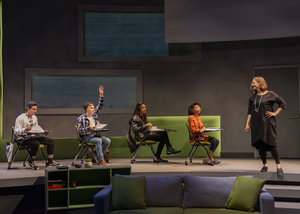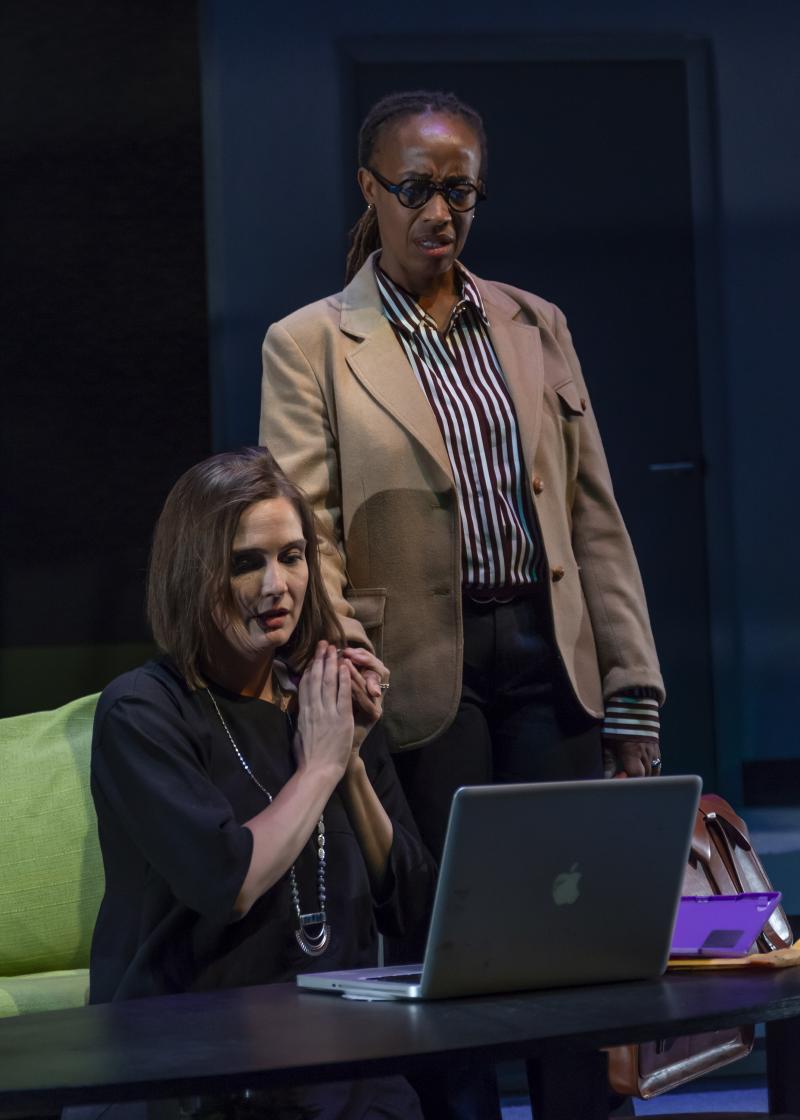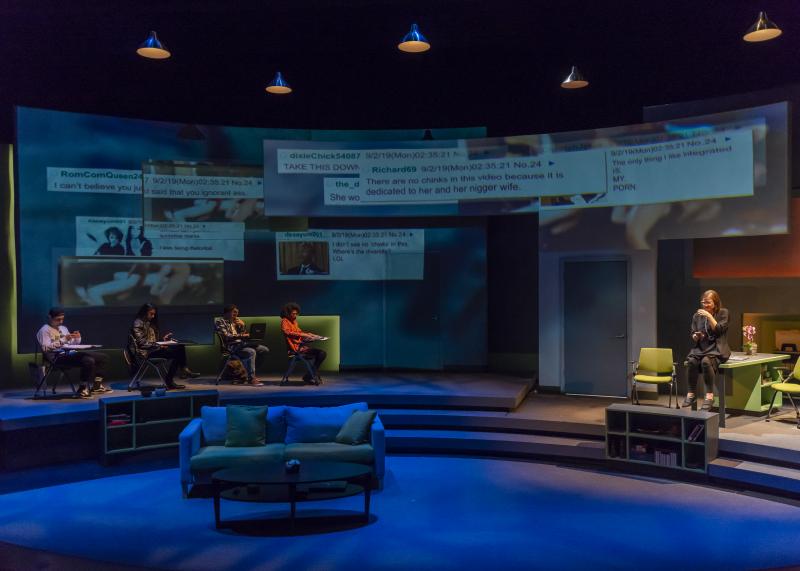Review: THEORY at Mosaic Theater Company

At Theory's opening, we are introduced to Isabelle, a first year, tenure-track professor who sees herself as a modern-day John Keating. Her goal is to teach her students to think, which is noble, but her methods are. . . questionable. Isabelle dramatically trashes the traditional Film Theory syllabus (which will look familiar to those in the audience who have taken similar classes) in favor of one that includes filmmakers of colour, women, and others underrepresented in the genre. But she also includes deliberately provocative materials, such as Soviet and Nazi propaganda and controversial films Birth of a Nation and Baise-Moi. She creates a discussion board outside of the university system that allows students to post without registering their identities, and encourages them to use the board for film discussion, cheerfully informing her astonished class that there will be no moderator, nor will any of their comments be deleted. She thinks she's promoting free thought, but anyone with an internet connection can predict what happens next - including her wife, Lee, who has spent her life facing racism, homophobia, and the rest the underbelly of the internet has to offer. Isabelle's willful ignorance and insistence that she is liberating young minds straddles idealism and white saviorism, and her refusal to consider the consequences of her radical methods leads her straight into a moral quandary about standing by her professed principles when a student (predictably) abuses the forum to post inflammatory videos and threatens Isabelle and Lee.
Theory is a difficult show to evaluate because the premise itself is so difficult. While the show makes some smart points - about the distinctions between being closed off to any opposition and having a valid opposition to hate speech, about progressive ideals versus white saviorism, about controversy and censorship - it also stumbles a little in what its message actually is. Also, while the show's creators are clearly academics (or live with them), some of the decisions made require a higher degree of suspension of disbelief than the audience may be prepared to give. This makes Mosaic's team's task much harder.

The cast and crew do give a solid performance. Musa Gurnis' Isabelle is confident, idealistic, and effervescent at the outset of her course. Gurnis captures her descent into paranoia and doubt in each motion and expression, without letting us forget that Isabelle, while a sympathetic character, is far from blameless for her circumstances, especially as each bad decision compounds the situation. As Isabelle's wife, Lee, Andrea Harris Smith, brings in a world-weariness that balances Isabelle's enthusiasm; she's been the young, radical professor before, and knows that sometimes it's better to play the long game rather than make a big statement. She's also a caring, supportive spouse who is pushed to breaking point, and watching Lee and Isabelle's relationship deteriorate is heartbreakingly honest. The flip side of Lee's perspective, though, is the Film Department head, Owen, played by Tony K. Nam. Nam's Owen is representative of many institutions that are more concerned with eliminating the appearance of a problem rather than actually solving it. Even after Isabelle received threats against her and her wife outside of school, he still advocates for taking actions that dismiss the problem; Nam perfectly conveys the blend of support and shutdown that is all-too-prevalent, especially in academia. Isabelle's large lecture class is represented by four students: Richard (Josh Adams), Davinder (Benairen Kane), Jorge (Camilo Linare), and Safina (Tyasia Velines). Each student has a distinct personality, but they collectively portray the chaos of the classroom and the message board, as well as the general anxieties students face. Kane's Davinder eloquently shows the impact of bullying, in any forum, and Adams' Richard is so convincingly creepy that he unnerves the audience.

Mosaic's Associate Artistic Director, Victoria Murray Baatin, makes her directorial debut with Theory. Overall, her instincts prove to be solidly informed, and the result is a show that, while flawed, shows her skill and potential. Daniel Ettinger's set is versatile and conveys both the comfortable domesticity of Isabelle and Lee's home as well as the more structured university lecture hall and office. Dylan Uremovich's projections are a great way to tie in the multimedia aspect of the film class, as well as the message boards and messages Isabelle receives from her students.
Theory is an interesting show with a strong cast and solid technical elements. It raises some valid questions about living our ideals and the limitations we set (or don't) on ourselves and others in public, but it never quite figures out how to go beyond that. Still, it opens conversations about these issues, and pushes audiences to reconsider their own perspectives, and there's certainly value in that.
Mosaic Theater Company's Theory is playing at the Atlas Performing Arts Center through November 17. The performance run time is approximately 85 minutes with no intermission. Additional information on tickets and post-performance discussions can be found on the Mosaic Theater Company website.
Photos Courtesy of Christopher Banks.
Reader Reviews

Videos
